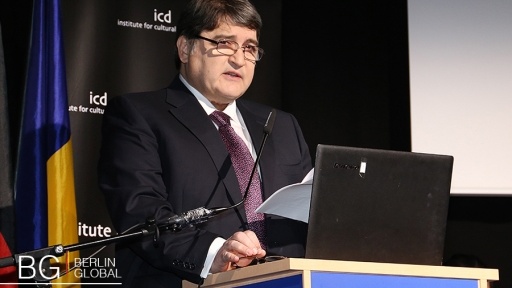 |
The Embassy of Romania in Berlin |
Contact

Adresse: Dorotheenstrasse 62 - 66, Berlin, D-10117
Tel.: +49 (0)30 21239202
Fax: +49 (0)30 21239399
Email: berlin@mae.ro
The Ambassador
Amb. Adriana-Loreta Stănescu
Adriana-Loreta Stanescu was born in Bucharest is married and has one son.
She studied from 1983 to 1987 at the Mathematics-Physics Highschool in Bucharest, rom 1987 to 1992 at the Polytechnic University of Bucharest, and from 1992-1994 she pursued her post-graduates studies at the National School for Political Studies and Public Administration (NSPSPA), within the faculty of International Relations. She’s been Teaching Assistant at the NSPSPA
from 1994 to 1996, International Relations expert, Secretariat, General Chief of Staff, Ministry of National Defence from 1995 to 1996, Attaché, Cabinet of the Minister of Foreign Affairs from 1997 to 1998; 3rd Secretary, Permanent Mission of Romania to the International Organizations in Vienna from 1998 to 2002; Deputy Director, NATO Department, Ministry of Foreign Affairs; 2002: 2nd Secretary, NATO Department, Ministry of Foreign Affairs in 2003. Afterwards, from 2003 to 2009 she’s been Counselor, Western and Central Europe Department, MFA; Chargé d'affaires a.i., Embassy of Romania to Vienna; 1st Secretary, Deputy Chief of Mission, Embassy of Romania to Vienna. Moreover Minister Counselor, Deputy Chief of Mission, Embassy of Romania to Berlin and Minister Plenipotentiary, Deputy Chief of Mission, Embassy of Romania to Berlin till 2015: Chargé d'affaires a.i, Embassy of Romania to Berlin till 2016.
Finally, from 2017 up to nowadays she’s been Minister Plenipotentiary, Director General, Head Department for Relations with Eastern Neighborhood and Special Envoy for Eastern Partnership.
History
Diplomatic relations between Romania and Germany began during the 1848 Revolution, when the provisional government at that time sent two diplomatic agents to France and Germany. In this regard, Ioan Maiorescu was the first Romanian representative in Germany.
On the 6th of May 1872 the first Romanian representative to Germany was sent to Berlin. On the 20th of February 1880, Germany recognized Romania’s independence and accepted the change from a diplomatic agency to a legation. The German Legation was established in Bucharest on the 1st of March 1880 and it was linked with the Consulates from Bucureşti, Iaşi, Brăila, Galaţi, Constanţa, Giurgiu şi Craiova.
On the 7th of March 1955, Romania and Germany reestablished diplomatic relations after the end of the Second World War. Romania was, after the USSR, the first country from the sovietic block to establish diplomatic relations at the Embassy level.
Based on a friendship treaty concluded in 1992, political relations between Germany and Romania have traditionally been close and friendly. Germany provided extensive assistance to help Romania prepare for accession to the European Union and to promote its integration within Europe. The two countries also work together in NATO, the United Nations, the OSCE and the Council of Europe as well as in regional EU initiatives such as the Danube Cooperation Process and the Eastern Partnership.
There are regular mutual visits by high-ranking politicians between Germany and Romania. Trade relations between Germany and Romania continue to develop in a very positive direction. German investments in Romania focus on the automotive supply sector, but service companies and large retail chains also make a substantial contribution to the country’s GDP.
Bilateral cultural relations are formally based on the 1995 cultural cooperation agreement and the 1996 accord on school cooperation. Cultural relations focus on research and higher education as well as on promoting the German language in Romania. Since February 2011 the German Embassy in Bucharest has been conducting a nationwide campaign in Romania entitled German – Language of Ideas aimed at getting young people in Romania interested in the German language and opening doors to research and academia, business and culture in Germany.
In 2012, the German, Austrian and Swiss Embassies and the Romanian Ministry of National Education set up a joint commission to promote German-language teaching in Romania’s education system. The German minority in Romania is also represented on this commission.
The Goethe Institute, the Institute for Foreign Cultural Relations, the Alexander von Humboldt Foundation, the German Academic Exchange Service (DAAD), the Central Agency for Schools Abroad (with more than 30 seconded teachers) and Germany’s political foundations all play an active role in Romania. The work of the Goethe Institute is complemented by the activities of the German Cultural Centres in Iasi, Cluj-Napoca, Sibiu, Brasov and Timisoara. There is a growing number of school and university partnerships between Romania and Germany. In 1999, Romania founded the cultural institute Titu Maiorescu in Berlin, which showcases Romanian culture through exhibitions, concerts and lectures.
The Embassy of Romania serves as an intermediary between Romania and Germany. It represents the interests of both Romania and Romanian people living in Germany. The Embassy analyses the home and foreign affairs, the economic and social situations and sends these reports back to Romania. Also, the Embassy is responsible for presenting and promoting Romanian’s foreign affairs objectives to Germany. In this regard, diplomats are developing a strong network with German officials, political, economic, cultural and mass-media representatives as well.
The Embassy of Romania serves as an intermediary between Romania and Germany. It represents the interests of both Romania and Romanian people living in Germany. The Embassy analyses the home and foreign affairs, the economic and social situations and sends these reports accordingly back to Romania. Also, the Embassy is responsible into presenting and promoting the Romanian’s foreign affairs objectives to Germany. In this regard, diplomats are developing a strong network with German officials, political, economic, cultural and mass-media representatives as well.










